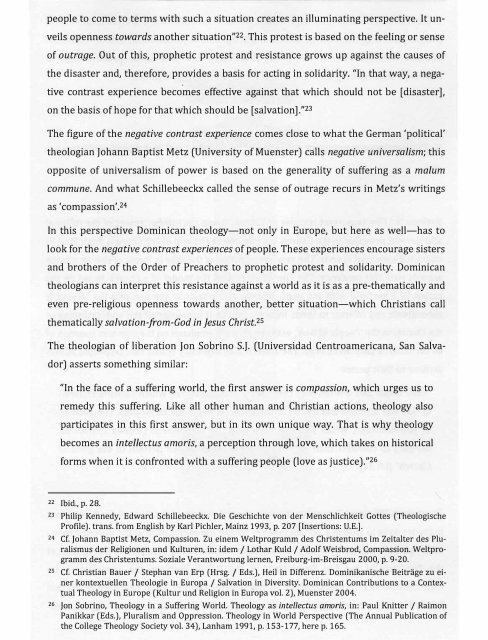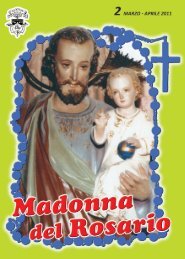ULRICH ENGEL
ULRICH ENGEL
ULRICH ENGEL
Create successful ePaper yourself
Turn your PDF publications into a flip-book with our unique Google optimized e-Paper software.
people to come to terms with such a situation creates an illuminating perspective. It unveils<br />
openness towards another situation"22. This protest is based on the feeling or sense<br />
of outrage. Out of this, prophetic protest and resistance grows up against the causes of<br />
the disaster and, therefore, provides a basis for acting in solidarity. uin that way, a negative<br />
contrast experience becomes effective against that which should not be [disaster],<br />
on the basis of hope for that which should be [salvation]."23<br />
The figure of the negative contrast experience comes close to what the German 'political'<br />
theologian Johann Baptist Metz (University of Muenster) calls negative universalism; this<br />
opposite of universalism of power is based on the generality of suffering as a malum<br />
commune. And what Schillebeeckx called the sense of outrage recurs in Metz's writings<br />
as 'compassion'.24<br />
In this perspective Dominican theology-not only in Europe, but here as well-has to<br />
look for the negative contrast experiences of people. These experiences encourage sisters<br />
and brothers of the Order of Preachers to prophetic protest and solidarity. Dominican<br />
theologians can interpret this resistance against a world as it is as a pre-thematically and<br />
even pre-religious openness towards another, better situation-which Christians call<br />
thematically salvation-from-God in Jesus Christ.2S<br />
The theologian of liberation }on Sobrino S.J. (Universidad Centroamericana, San Salvador)<br />
asserts something similar:<br />
uin the face of a suffering world, the first answer is compassion, which urges us to<br />
remedy this suffering. Like all other human and Christian actions, theology also<br />
participates in this first answer, but in its own unique way. That is why theology<br />
becomes an intellectus amoris, a perception through love, which takes on historical<br />
forms when it is confronted with a suffering people (love as justice )."26<br />
22 Ibid., p. 28.<br />
2 3 Philip Kennedy, Edward Schillebeeckx. Die Geschichte von der Menschlichkeit Gottes (Theologische<br />
Profile). trans. from English by Karl Pichler, Mainz 1993, p. 207 [Insertions: U.E.].<br />
2 4 Cf. Johann Baptist Metz, Compassion. Zu einem Weltprogramm des Christentums im Zeitalter des Pluralismus<br />
der Religionen und Kulturen, in: idem I Lothar Kuld I Adolf Weisbrod, Compassion. Weltprogramm<br />
des Christentums. Soziale Verantwortung lernen, Freiburg-im-Breisgau 2000, p. 9-20.<br />
25 Cf. Christian Bauer 1 Stephan van Erp (Hrsg. 1 Eds.), Heil in Differenz. Dominikanische Beitrage zu einer<br />
kontextuellen Theologie in Europa I Salvation in Diversity. Dominican Contributions to a Contextual<br />
Theology in Europe (Kultur und Religion in Europa vol. 2), Muenster 2004.<br />
26 }on Sobrino, Theology in a Suffering World. Theology as intellectus amoris, in: Paul Knitter I Raimon<br />
Panikkar (Eds.), Pluralism and Oppression. Theology in World Perspective (The Annual Publication of<br />
the College Theology Society vol. 34), Lanham 1991, p. 153-177, here p. 165.



